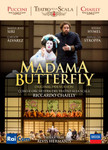|
Back
03/07/2019
Giacomo Puccini: Madama Butterfly
María José Siri (Madama Butterfly), Bryan Hymel (Pinkerton), Annalisa Stroppa (Suzuki), Carlos Alvarez (Sharpless), Nicole Brandolino (Kate Pinkerton), Carlo Bosi (Goro), Costantino Finucci (Prince Yamadori), Abramo Rosalen (The Bonze), Leonardo Galeazzi (Yakusidé), Gabriele Sagona (The Imperial Commissioner), Romano dal Zovo (The Registrar), Mariza Castellini (Cio-Cio San’s mother), Maria Miccoli (Cio-Cio San’s aunt), Roberta Salvati (Cio-Cio San’s cousin), Chorus and Orchestra of the Teatro alla Scala, Bruno Casoni (chorus master), Riccardo Chilly (conductor), Alvis Hermanis (stage director and co-set designer), Leila Fteita (co-set designer), Kristine Jurjane (costume designer), Gleb Filshtinsky (lighting designer), Ineta Sipunova (video projection), Patrizia Carmine (television director)
A production of Rai Com, Recording: La Scala, Milan, Italy (December 7, 2016) – 167’
Decca 074 3982 (or Blu ray 074 3985) – LPCM 24-bit Stereo – Picture format 16:9 – (Distributed by Universal Music) – Booklet in English – Subtitles in Italian, English, French and German

   
Giacomo Puccini found a sense of unsettled permanence inside his œuvres, for he kept tinkering with the operas after their premiere. Neither was Madama Butterfly immune to such reactionary tweaking. Despite its disastrous La Scala opening, Riccardo Chailly returns to the original two-act version with restoration of cuts from the 1920 Carcano rendition, including reinstatement of roughly 1,000 bars of music. Because Puccini never chose a definitive version, M. Chailly sees Madama Butterfly as a “working document” in which he metes out a “moral recompense”, assuaging gross derisions Puccini experienced in 1904. Riccardo Chailly makes a compelling argument.
Alvis Hermanis’ blending of physical product with Ineta Sipunova’s video landscaping not only positions itself as aesthetically provoking, it allows a subtle shift of drama that wriggles the viewer into a state of perpetual uneasiness and heightened anticipation. Kristine Jurjane’s costuming is bathed inside a serene color palette that gracefully bows to Nagasaki harmonics while pulsed by the lucent rays from Gleb Filshtinsky. This Madama Butterfly has a first-class depiction of true Kabuki theatre, a veritable art form that Alla Sigalova fluidly weaves at every turn of Puccini’s music. The entire production has an endless run of gracious elegance.
This broad picture is important to convey since it sizes up the music and character development. Additive weight is placed within Act I where we hear Bryan Hymel strongly harping on his Yankee bravado and vagabond spirit (ref: “Dovunque al mondo.”) This comes back to haunt him at the end of the opera. It is here that Suzuki (Annalisa Stroppa) and Kate (Nicole Brandolino) play a much more significant role in their engagement with Butterfly. Both singers add powerful substance with an absent Pinkerton. By indirect, deductive reasoning, this section re-emphasizes Pinkerton’s inappropriate behavior and strengthens his cowardice. The suspense is maintained. Had M. Chailly decided not to remove Pinkerton’s aria, “Addio, fiorita asil”, the final theatrical blow would have been diluted. Thus, we have nonstop momentum running all the way to the closing curtain. Act I’s direction also doses out a bit of levity with the addition of Yakusidé’s drunken romance (Leonardo Galeazzi), helping to build into collapse when The Bonze (Abramo Rosalen) suddenly appears on the set’s second tier, “holding court” by boldly raising his arms in condemnation of Butterfly.
Uruguay native María José Siri rose to prominence when she sang the leading role, not only as her debut but to also usher in La Scala’s 2016/2017 season. It was fortuitous, for her deep and steely voice bathes with a certain innocent rawness while, at times, quickly piercing the air with utmost lightness. In summation, we have a decidedly intelligent draw into the tragedy of this 15 year-old geisha.
Perhaps Madama Butterfly’s theatric annihilation is best channeled through Carlos Alvarez and his Sharpless. Patrizia Carmine’s television edits pick up on the baritone’s nuanced facial expressions. Seen as a diplomatic portage between Eastern and Western thought, M. Alvarez’s feeling is genuine as he squirms with uneasiness over the entire ordeal...most appropriate and effectively tendered.
With five versions at hand, Riccardo Chailly’s reading has a powerful postulation to consider. Strongly recommended for any Madama Butterfly fan.
Christie Grimstad
|